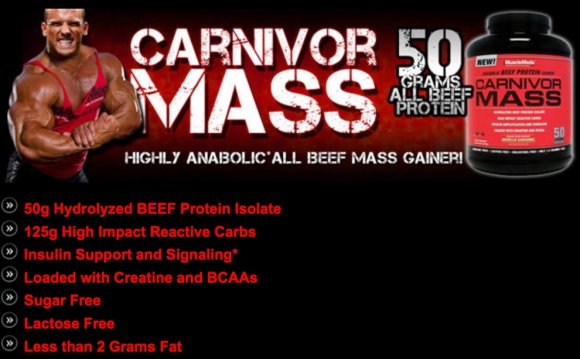
Of these calories, you should be aiming for at least one gram of protein per pound of body weight (170 grams for our example). You can bring this up to 1.5-2 if you wish, but going any higher isn't really all that beneficial. The body will just end up breaking down this excess protein, excreting some of it, and then either using the other calories for energy or storing them as body fat.
How you then choose to divide the remaining calories between carbohydrates and fat is really up to you. If you tend to feel tired, sluggish, bloated, and so on after a very carb heavy meal, you'll likely do better on a higher fat approach.
On the flip side, if you find you feel great and energized after a high carb meal, then you'll likely want to go a high carb route instead.
As a guideline though, when bulking, aim for at least 100 grams of carbs per day (in addition to ones to support training) to stay out of ketosis (which can make it harder to add muscle), and go no lower than 15% fat as this is what's essential to keep hormonal functions running properly and keep testosterone levels where they should be.
So, let's say you're going to do about a 30-30-40 ratio, in terms of protein, carbs, and fat. This would equate to about 190 grams protein, 190 grams carbs, and 115 grams fat, for a total of 2550 calories.
Meals
Now, when it comes to choosing how many meals you'll eat, this can be largely variable. If you are someone who does better eating quite frequently, break this into 4-6 meals a day, in addition to your pre/post workout meal.
If, on the other hand, you find that worrying about getting all of your meals in causes you a lot of stress, aim instead to have three meals a day, along with the pre-/post-workout meals.
The old notion that you need to eat every 2-3 hours is just not correct. Your body is not going to start catabolizing muscle if it goes three hours and one minute without food; this is especially true when you are already in a calorie surplus.
The only reason why it might be more beneficial to consume more meals per day is because if you are a male who has to eat a very large volume of calories in order to see any weight gaining happening, trying to get so many calories in at once can pose a bit of a challenge at times.
Now, when it comes to the constituents of those meals, this is what you should pay attention to:
Protein
During the morning, you'll want to get some fast acting protein into the body, so you can quickly get protein to the muscle cells after the overnight fast. For this reason, consider a breakfast that contains eggs, white fish, or some type of protein powder isolate blended with a shake. These will all be broken down by the body quickly, entering the blood stream as rapidly as possible.
Carbohydrates
In terms of carbs and fat, your carbohydrate intake can be a mix of simple and complex. The simple carbs will help provide a small insulin spike, which then helps the amino acids further get to that muscle tissue sooner. On the other side, the complex carbohydrates you choose to eat during this period will help provide a lasting source of energy.
So, examples of this could be juice with some oatmeal, a couple pieces of fruit with a bowl of whole-wheat cereal, or a bagel with some low-sugar yogurt.
Fats
Finally, some healthy fat should be consumed in this period to both help get those calories up. Natural peanut butter generally works the easiest for the morning meal since it goes well with break-fast types of foods, but if you'd prefer another source, feel free to add it in (nuts are another example).
Afternoon
Now, moving to the afternoon hours, here you want to also keep your protein intake up, along with providing the body with slower burning sources of carbohydrates. This will help to ensure that the muscles are getting nutrients over the entire day to promote anabolism and prevent the accumulation of fat that can be seen when large insulin spikes are created.
Good options for daytime meals would include chicken breast, fish, salmon, and turkey, along with brown rice, brown pasta, whole wheat breads, or potatoes, veggies, and then a healthy source of fats such as nuts, olive oil, flax seeds, or avocado.
Night-Time Hours
Finally, as you move into the night-time hours, you should be focused on foods that will be the slowest digesting in nature to support muscle growth during the overnight period, when growth hormone is typically at its highest.
INTERESTING VIDEO












